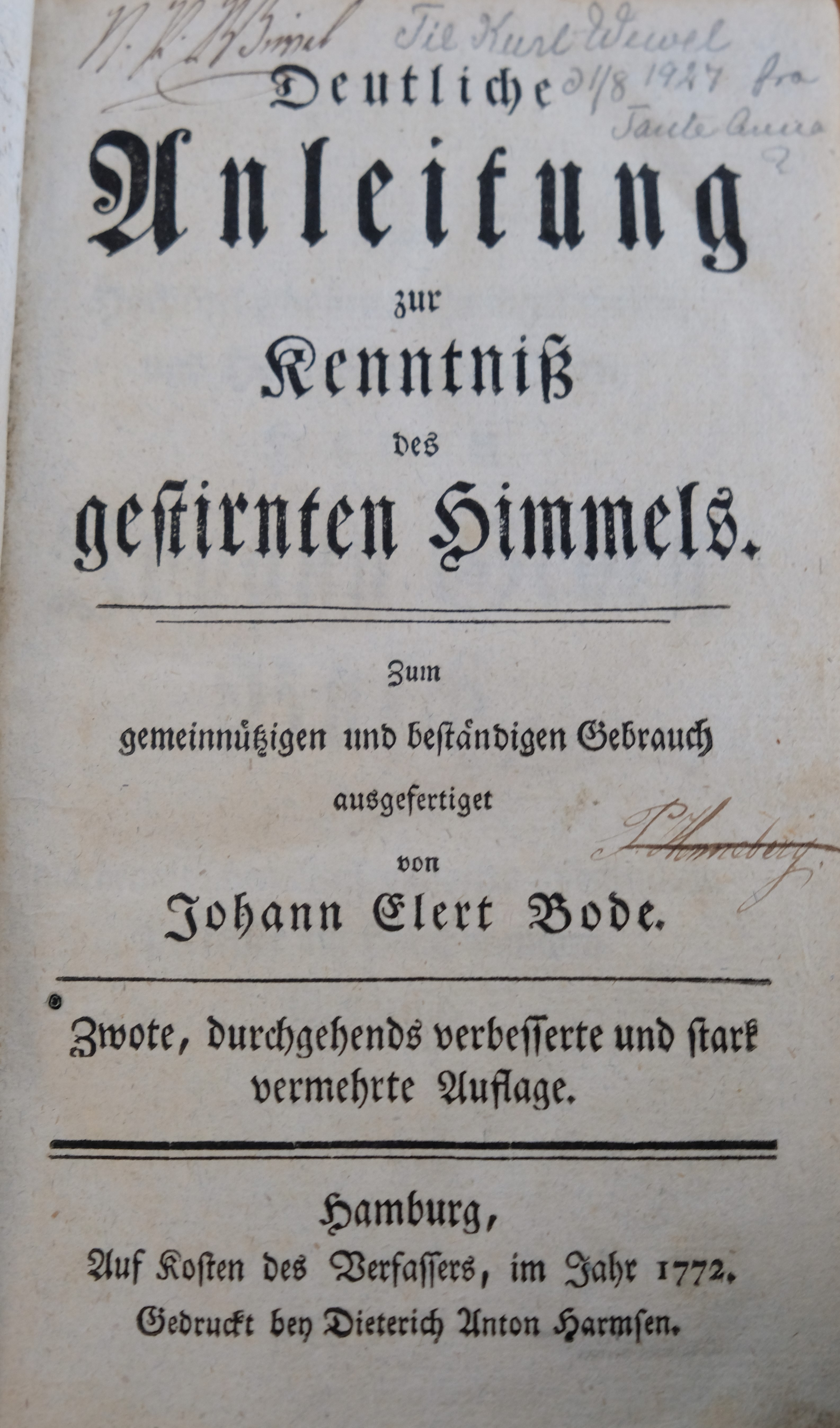|
Johann Georg Büsch
Johann Georg Büsch (January 3, 1728 at Alten-Weding in Hanover – August 5, 1800 in Hamburg) was a German mathematics teacher and writer on statistics and commerce. Biography He was educated at Hamburg and Göttingen, and in 1756 was made professor of mathematics in the Hamburg gymnasium, which post he held until his death. Besides suggesting many theoretical improvements in the carrying on of trade by the city, he brought about the establishment of an association for the promotion of art and industry (), and the foundation of a school of trade, instituted in 1767, which became under his direction one of the most noted establishments of its class in the world. For some time before his death Büsch was almost totally blind. As a mathematics teacher he mentored and helped the young Johann Elert Bode, who later became a famous astronomer. Works Besides a history of trade (''Geschichte der merkwürdigsten Welthändel'', Hamburg, 1781), he wrote voluminously on all subjects connec ... [...More Info...] [...Related Items...] OR: [Wikipedia] [Google] [Baidu] |
Johann Andreas Segner
Johann Andreas von Segner (, , , ; October 9, 1704 – October 5, 1777) was a Hungarian scientist of German descent. He was born in the Kingdom of Hungary, in the former Hungarian capital city of Pozsony, or Pressburg (today Bratislava). Early life and education Johann Segner was born to Johann Michael von Segner and his wife Christine von Segner (née Fischer) on probably the 10 October 1704. Other sources mention also the 4 or the 9 October. His father was a tax clerk. His paternal ancestors came from Styria to Pressburg in the Kingdom of Hungary; by the 18th century. In 1596 the family was granted nobility for their military accomplishments by Rudolph II. He studied at Pressburg and Debrecen. In April 1725, Segner began studying at the University of Jena. Under the guidance of Georg Erhard Hamberger, Segner developed an evidence for the cartesian rule of signs. In his third year at Jena, he began to teach other students in mathematics. During his stay in Jena, he was sup ... [...More Info...] [...Related Items...] OR: [Wikipedia] [Google] [Baidu] |
Johann Elert Bode
Johann Elert Bode (; 19 January 1747 – 23 November 1826) was a German astronomer known for his reformulation and popularisation of the Titius–Bode law. Bode determined the orbit of Uranus and suggested the planet's name. Life and career Bode was born in Hamburg. As a youth, he suffered from a serious eye disease that particularly damaged his right eye; he continued to have trouble with his eyes throughout his life. His early promise in mathematics brought him to the attention of Johann Georg Büsch, who allowed Bode to use his own library for study. He began his career with the publication of a short work on the solar eclipse of 5 August 1766. This was followed by an elementary treatise on astronomy entitled ''Anleitung zur Kenntniss des gestirnten Himmels'' (1768, 10th ed. 1844), the success of which led to his being invited to Berlin by Johann Heinrich Lambert in 1772 for the purpose of computing ephemerides on an improved plan. There he founded, in 1774, the well-kno ... [...More Info...] [...Related Items...] OR: [Wikipedia] [Google] [Baidu] |
German Activists
German(s) may refer to: * Germany, the country of the Germans and German things **Germania (Roman era) * Germans, citizens of Germany, people of German ancestry, or native speakers of the German language ** For citizenship in Germany, see also German nationality law **Germanic peoples (Roman era) *German diaspora * German language * German cuisine, traditional foods of Germany People * German (given name) * German (surname) * Germán, a Spanish name Places * German (parish), Isle of Man * German, Albania, or Gërmej * German, Bulgaria * German, Iran * German, North Macedonia * German, New York, U.S. * Agios Germanos, Greece Other uses * German (mythology), a South Slavic mythological being * Germans (band), a Canadian rock band * "German" (song), a 2019 song by No Money Enterprise * ''The German'', a 2008 short film * "The Germans", an episode of ''Fawlty Towers'' * ''The German'', a nickname for Congolese rebel André Kisase Ngandu See also * Germanic (disambiguati ... [...More Info...] [...Related Items...] OR: [Wikipedia] [Google] [Baidu] |
18th-century German Educators
The 18th century lasted from 1 January 1701 (represented by the Roman numerals MDCCI) to 31 December 1800 (MDCCC). During the 18th century, elements of Enlightenment thinking culminated in the Atlantic Revolutions. Revolutions began to challenge the legitimacy of monarchical and aristocratic power structures. The Industrial Revolution began mid-century, leading to radical changes in human society and the environment. The European colonization of the Americas and other parts of the world intensified and associated mass migrations of people grew in size as part of the Age of Sail. During the century, slave trading expanded across the shores of the Atlantic Ocean, while declining in Russia and China. Western historians have occasionally defined the 18th century otherwise for the purposes of their work. For example, the "short" 18th century may be defined as 1715–1789, denoting the period of time between the death of Louis XIV of France and the start of the French Revolution, ... [...More Info...] [...Related Items...] OR: [Wikipedia] [Google] [Baidu] |
